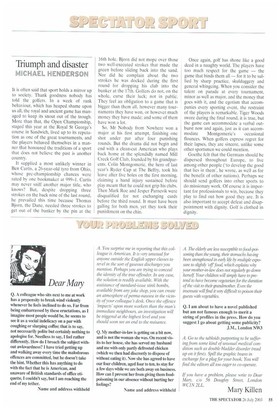Triumph and disaster
MICHAEL HENDERSON
It is often said that sport holds a mirror up to society. Thank goodness nobody has told the golfers. In a week of rank behaviour, which has heaped shame upon us all, the royal and ancient game has managed to keep its snout out of the trough. More than that, the Open Championship, staged this year at the Royal St George's course in Sandwich, lived up to its reputation as one of the great tournaments, and the players behaved themselves in a manner that honoured the traditions of a sport that does not believe the past is another country.
It supplied a most unlikely winner in Ben Curtis, a 26-year-old tyro from Ohio, whose pre-championship chances were rated by one bookmaker at 999-1. Curtis may never sniff another major title, who knows? But, despite dropping three strokes on the back nine of the last round, he prevailed this time because Thomas Bjorn. the Dane, needed three strokes to get out of the bunker by the pin at the 16th hole. Bjorn did not mope over those two well-executed strokes that made the green before sliding back into the sand. Nor did he complain about the two strokes he was docked during the first round for dropping his club into the bunker at the 17th. Golfers do not, on the whole, curse their luck; not in public. They feel an obligation to a game that is bigger than them all, however many tournaments they have won, or however much money they have made; and some of them have won a lot.
So, Mr Nobody from Nowhere won a major at his first attempt, finishing one shot under par after four punishing rounds. But the drama did not begin and end with a clean-cut American who plays back home at the splendidly named Mill Creek Golf Club, founded by his grandparents. Colin Montgomerie, the hero of last year's Ryder Cup at The Belfry, took his leave after five holes on the first morning, claiming a hand injury sustained before play meant that he could not grip his clubs. Then Mark Roe and Jesper Parnevik were disqualified for not exchanging cards before the third round. It must have been galling for both men, yet they took their punishment on the chin. Once again, golf has shone like a good deed in a naughty world, The players have too much respect for the game — the game that binds them all — for it to be sullied by sharp practice, skulduggery and general whingeing. When you consider the talent on parade at every tournament, minor as well as major, and the money that goes with it, and the egotism that accompanies every sporting event, the restraint of the players is remarkable. Tiger Woods swore during the final round, it is true, but the game can accommodate a verbal outburst now and again, just as it can accom modate Montgomerie's occasional flounces. When golfers express regret for their lapses, they are sincere, unlike some other sportsmen we could mention.
Goethe felt that the Germans should be dispersed throughout Europe, to live among other people ('to develop the good that lies in them', he wrote, as well as for the benefit of other nations). Perhaps we should send golfers into other sports to do missionary work. Of course it is important for professionals to win, because they play to find out how good they are. It is also important to accept defeat and disappointment with dignity. Golf is clothed in dignity.


























































 Previous page
Previous page